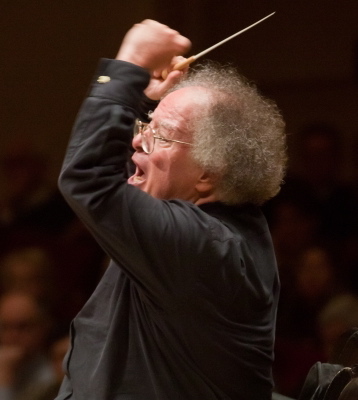Levine shows his mettle with a powerful Mahler 9
When James Levine made his “comeback” appearance at Carnegie Hall in 2013, one of the major questions was not just whether he could conduct, but whether he had the stamina to conduct a long symphonic score. He silenced doubters Sunday with a program that, with intermission, ran about two hours, including Schubert’s massive Ninth Symphony.
This concert with the Metropolitan Opera Orchestra was even longer—most conductors are content to present Mahler’s Ninth (and several of his other symphonies) by itself; at ninety minutes it is about as long as many full concerts. Levine paired it with a full-length piano concerto, Mozart’s No. 23, making this one of the longest concerts of the season thus far.
It isn’t every day that the orchestra will be the star of a concerto, but that’s what happened on Sunday, or close to it. Maurizio Pollini, Sunday’s soloist, has of course been an important artist in his career, known for his polish, among other things, but you’d hardly know it from how he played the Mozart. Almost every minute was a struggle.
The opening Allegro maestoso started well—the orchestra was supremely steady under Levine’s baton, and their sound was luminous in the orchestral exposition. But Pollini flubbed his opening runs, and was insecure throughout the movement. It sounded as though he was struggling just to get his hands around the notes, leaving little time to worry about phrasing.
The Andante was more solid, though Pollini’s playing was still straight, and he was not listening closely to the orchestra. In the last movement he practically dashed out of his skin, rushing ahead whenever he hit complicated passagework and often tripping over himself along the way. Levine was having a devil of a time following him—in the hands of a lesser orchestra or a lesser conductor, this could have been a real train wreck.
It was harder to get a read on Levine’s interpretation of the Mahler. This symphony’s ending is a difficult one to pull off, as it takes a long time to wind down before finally dissolving. The denouement on Sunday felt drawn out, its tension dissipating and attention wavering.
It’s too bad that the ending didn’t quite come off, since what came before was consistently powerful playing. From the very opening, when the orchestra is slowly assembled piece by piece, to the heart-swelling bars before those closing minutes of the final Adagio, the Met orchestra showed once again that they are among the very best, in or out of the pit.
The orchestra showed off stunning tone and the range Levine got from them was spectacular, from gossamer to piercing, from chilly to smoldering. There was something rough about the reading of the first movement, the Andante comodo, that magnified its internal struggle. At one moment there would be a roar of percussion, and the next a lyrical horn strain, a glimmer of heroism trying to break through the darkness. These horns were unimpeachable—for many orchestras, the brass section can be a liability, but the Met’s, always clear, bright-toned, and above all, in tune, is a tremendous asset.
A more playful, but still rugged, side came through in the second movement as the coy lilting of the winds was continuously interrupted by raucous stomping from everyone else. The Rondo-Burleske had a similar muscular quality, whirling the audience around as it presented a kind of ordered chaos.
As mentioned before, the ending was hard to parse (even harder than it already is in the score). The rest of the Adagio, though, was spellbinding, a thick mesh of sound with a prismatic array of colors. The huge, blazing string tone that opened the movement quickly resolved into singing, gauzy tenderness, but without losing any of its intensity. Concertmaster David Chan’s solos were winning throughout the symphony, creating a character for the audience to relate to even in the moments of greatest confusion.





Posted Oct 14, 2014 at 6:13 am by elaine drootin
I heard a different concert
The great Pollini is heads above any pianist today even though he has had health issues lately
He seems to have direct contact with the many composers whose works are all at his disposal,always illuminating their work and not his own incredible virtuosity
His playing of all the Beethoven sonatas was a revelation
Don’t artists of his stature deserve respect from reviewers who often are too young to have followed their careers through the years???
I was thrilled to hear this concert throughout,two giants of the music world still at their best!
Posted Oct 14, 2014 at 11:52 am by Daniel Farber
Suggest it was the reviewer who, with “attention wavering” because of a concert that was too long by one Mozart piano concerto, could not quite feel the effectiveness of the huge spaces in the “drawn-out” conclusion. Levine should be commended for the huge risk of taking so slow a tempo and then for not “cheating” those enormous rests in the final pages. The proof of all this was the nearly complete silence and stillness during those rests in a hall packed to its 2804 capacity. Otherwise a very fair-minded critique, unlike that in the NY Times.
Posted Oct 29, 2014 at 7:05 am by John Howes
The ending of the Mahler 9th was too long? Perhaps Mr. Simpson kept looking at his watch because he was running late for another appointment? Come on. This was Mahler like Mahler is rarely heard. It was on overwhelming performance.